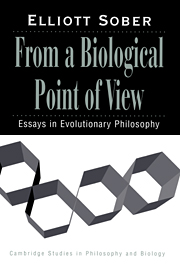Book contents
- Frontmatter
- Contents
- Acknowledgments
- Introduction
- 1 Did evolution make us psychological egoists?
- 2 Why not solipsism?
- 3 The adaptive advantage of learning and a priori prejudice
- 4 The primacy of truth-telling and the evolution of lying
- 5 Prospects for an evolutionary ethics
- 6 Contrastive empiricism
- 7 Let's razor Ockham's razor
- 8 The principle of the common cause
- 9 Explanatory presupposition
- 10 Apportioning causal responsibility
- 11 Evolution, population thinking, and essentialism
- 12 Temporally oriented laws
- Index
Introduction
Published online by Cambridge University Press: 14 January 2010
- Frontmatter
- Contents
- Acknowledgments
- Introduction
- 1 Did evolution make us psychological egoists?
- 2 Why not solipsism?
- 3 The adaptive advantage of learning and a priori prejudice
- 4 The primacy of truth-telling and the evolution of lying
- 5 Prospects for an evolutionary ethics
- 6 Contrastive empiricism
- 7 Let's razor Ockham's razor
- 8 The principle of the common cause
- 9 Explanatory presupposition
- 10 Apportioning causal responsibility
- 11 Evolution, population thinking, and essentialism
- 12 Temporally oriented laws
- Index
Summary
Philosophers have tried to learn from science in two quite different ways. First, the contents of particular scientific theories have thrown light on philosophical problems. For example, philosophers interested in the nature of space and time have found much of interest in relativity theory. As sometimes happens in the history of thought, a problem that begins its life as a problem in philosophy later turns out to receive illumination from a body of scientific results. Philosophy then has to catch up with the news from outside.
A second avenue of influence develops when philosophers contemplate the character of science itself. Here scientific theories serve as examples. Relativity theory says nothing about what scientific knowledge is; its subject is space, time, and motion, not the nature of inquiry. Still, the hypotheses of relativity theory have been an important point of reference for philosophers seeking to understand how the human mind is able to grasp a reality outside itself.
I've called this collection of papers From a Biological Point of View because it is biology – particularly the theory of evolution – that has performed, in my own work, the two functions just described. I believe that the contents of biological theories speak to problems that first saw the light of day as problems in philosophy.
- Type
- Chapter
- Information
- From a Biological Point of ViewEssays in Evolutionary Philosophy, pp. 1 - 7Publisher: Cambridge University PressPrint publication year: 1994

